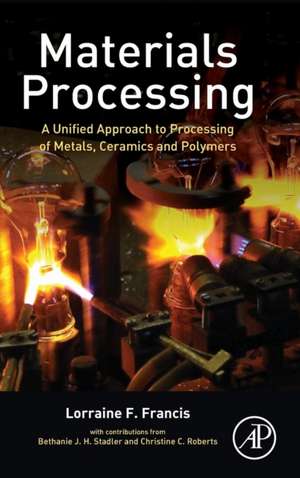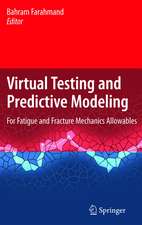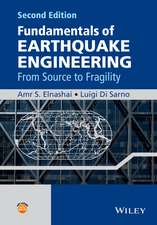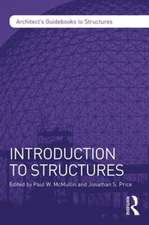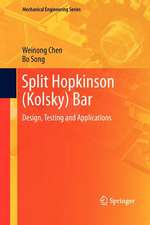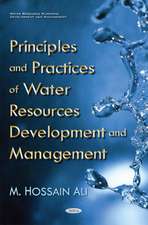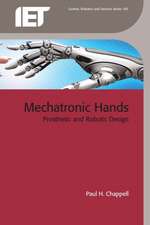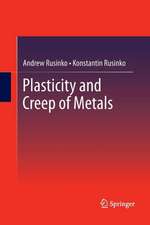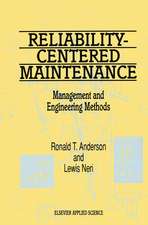Materials Processing: A Unified Approach to Processing of Metals, Ceramics and Polymers
Autor Lorraine F. Francisen Limba Engleză Hardback – 5 ian 2016
"Materials Processing" teaches students the fundamental principles involved in the processing of engineering materials, specifically metals, ceramics and polymers, from starting or raw materials through to the final functional forms. Processing is frequently treated from a materials specific point of view with courses and books that cover only one type of engineering material. This new text covers processing using a unified approach that is based on the state of matter most central to the shaping of the material: melt, solid, powder, dispersion and solution, and vapor. With this approach, students learn processing fundamentals and appreciate the similarities and differences between the materials classes.
Coverage of metal, ceramic and polymer processing in a single text provides a self-contained approach and consistent nomenclature that allow for easier comparisons between various materials and processesEmphasis on fundamental principles gives students a strong foundation for understanding processing and manufacturing methodsDevelopment of connections between processing and structure builds on students existing knowledge of structure - property relationshipsExamples of both standard and newer additive manufacturing methods throughout provide students with an overview of the methods that they will likely encounter in their careers"
| Toate formatele și edițiile | Preț | Express |
|---|---|---|
| Paperback (1) | 583.98 lei 5-7 săpt. | +62.91 lei 6-12 zile |
| ELSEVIER SCIENCE – 26 apr 2024 | 583.98 lei 5-7 săpt. | +62.91 lei 6-12 zile |
| Hardback (1) | 721.41 lei 6-8 săpt. | |
| ELSEVIER SCIENCE – 5 ian 2016 | 721.41 lei 6-8 săpt. |
Preț: 721.41 lei
Preț vechi: 936.90 lei
-23% Nou
138.04€ • 144.90$ • 114.58£
Carte tipărită la comandă
Livrare economică 11-25 aprilie
Specificații
ISBN-10: 0123851327
Pagini: 614
Ilustrații: Approx. 250 illustrations
Dimensiuni: 152 x 229 x 36 mm
Greutate: 1.09 kg
Editura: ELSEVIER SCIENCE
Public țintă
Junior/senior level undergraduate and first-year graduate students in Materials Science and Engineering.Cuprins
2. Starting Materials
3. Melt Processes
4. Solid Processes
5. Powder Processes
6. Dispersion and Solution Processes
7. Vapor Processes
Recenzii
Descriere
"Materials Processing" teaches students the fundamental principles involved in the processing of engineering materials, specifically metals, ceramics and polymers, from starting or raw materials through to the final functional forms. Processing is frequently treated from a materials specific point of view with courses and books that cover only one type of engineering material. This new text covers processing using a unified approach that is based on the state of matter most central to the shaping of the material: melt, solid, powder, dispersion and solution, and vapor. With this approach, students learn processing fundamentals and appreciate the similarities and differences between the materials classes.
Coverage of metal, ceramic and polymer processing in a single text provides a self-contained approach and consistent nomenclature that allow for easier comparisons between various materials and processesEmphasis on fundamental principles gives students a strong foundation for understanding processing and manufacturing methodsDevelopment of connections between processing and structure builds on students existing knowledge of structure - property relationshipsExamples of both standard and newer additive manufacturing methods throughout provide students with an overview of the methods that they will likely encounter in their careers"
